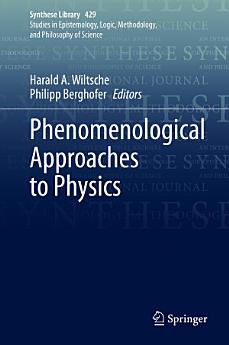Phenomenological Approaches to Physics
About this ebook
Much has been written on the interrelations between philosophy and physics in the late 19th and early 20th century, and on the emergence of philosophy of science as an autonomous philosophical sub-discipline. This book is about the under-explored role of phenomenology in the development and the philosophical interpretation of 20th century physics.
Part 1 examines questions about the origins and value of phenomenological approaches to physics. Does the work of classical phenomenologists such as Husserl, Merleau-Ponty or Heidegger contain elements of systematic value to both the practice and our philosophical understanding of physics? How did classical phenomenology influence “standard” philosophy of science in the Anglo-American and other traditions?
Part 2 probes questions on the role of phenomenology in the philosophies of physics and science:
- Can phenomenology help to solve “Wigner’s puzzle”, the problem of the "unreasonable effectiveness" of mathematics in describing, explaining and predicting empirical phenomena?- Does phenomenology allow better understanding of the principle of gauge invariance at the core of the standard model of contemporary particle physics?
- Does the phenomenological notion of “Lifeworld” stand in opposition to the “scientific metaphysics” movement, or is there potential for dialogue?
Part 3 examines the measurement problem. Is the solution outlined by Fritz London and Edmond Bauer merely a re-statement of von Neumann’s view, or should it be regarded as a distinctively phenomenological take on the measurement problem? Is phenomenology a serious contender in continuing discussions of foundational questions of quantum mechanics? Can other interpretational frameworks such as quantum Bayesianism benefit from implementing phenomenological notions such as constitution or horizonal intentionality?Ratings and reviews
About the author
Harald A. Wiltsche is Professor of Philosophy of Science at Linköping University, Sweden. He is also P.I. of a 4-year, externally funded research project on Hermann Weyl’s philosophy of physics, which is financed by the Austrian Science Fund. Harald’s research interests include philosophy of science (with a special focus on the physical sciences), epistemology and phenomenology.
Philipp Berghofer is a Post-Doc researcher and lecturer at the Philosophy Department of the University of Graz, Austria. His research focus centers around epistemology, phenomenology, philosophy of physics, and philosophy of science. Having finished his dissertation project in June 2019, Philipp’s position is now externally funded by the research project “Intentionality and Symbolic Construction: The Phenomenological Background of Hermann Weyl’s Philosophy of Physics” granted by the Austrian Science Fund (P. I.: Harald Wiltsche)..






